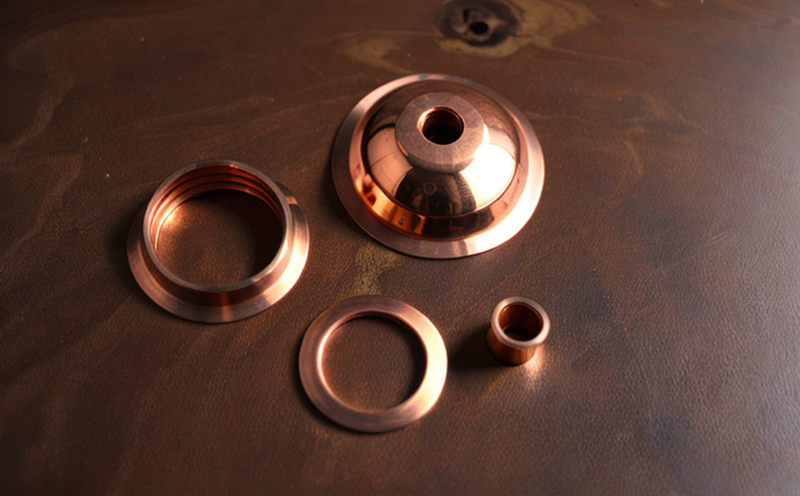ASTM E595 Outgassing Testing of Aerospace Materials
The ASTM E595 standard is a critical specification in the aerospace and aviation sectors, designed to evaluate the outgassing properties of materials intended for use within vacuum environments. This testing ensures that materials do not release volatile organic compounds (VOCs) or other contaminants into the surrounding environment, which could lead to degradation of sensitive components or systems.
In the context of aerospace applications, such as spacecraft, satellites, and avionics equipment, outgassing is a significant concern. The vacuum conditions present in space can exacerbate issues related to outgassing, leading to potential contamination of optical sensors, electronics, and other critical components. Therefore, ASTM E595 testing plays a crucial role in ensuring the reliability and longevity of aerospace materials.
The testing process involves placing a sample under controlled heating within a vacuum chamber. The gaseous products released by the material during this process are monitored using mass spectrometry or infrared absorption techniques. The outgassing rate is typically reported as the total amount of gas produced per unit area over time, measured in units such as ppm·cm2/h.
The primary goal of ASTM E595 testing is to identify materials that can be used safely in vacuum environments without compromising the integrity or performance of the equipment. This includes not only ensuring that the material itself does not outgas excessively but also verifying that any adhesives, coatings, or other surface treatments applied do not contribute significantly to outgassing.
For aerospace applications, this test is particularly important for materials like copper and brass, which are widely used due to their excellent electrical conductivity, thermal properties, and resistance to corrosion. The testing ensures these metals meet stringent requirements set forth by international standards such as ASTM E595, ensuring they do not adversely affect the performance of spacecraft or aviation equipment.
It is essential for quality managers, compliance officers, R&D engineers, and procurement teams involved in aerospace projects to understand the significance of ASTM E595 testing. Properly conducted outgassing tests can prevent costly failures and ensure that materials meet stringent regulatory requirements set by agencies like NASA or the FAA.
Why It Matters
Outgassing, particularly in vacuum environments, is a critical concern for aerospace components. The presence of volatile organic compounds (VOCs) can lead to contamination and degradation of sensitive equipment, affecting the overall performance and reliability of systems.
- Volatile Organic Compounds (VOCs): These are gases that evaporate at room temperature, which can contaminate surfaces within a vacuum chamber. In aerospace applications, even trace amounts of VOCs can have significant impacts on the functionality and lifespan of equipment.
- Ethylene: A common byproduct of outgassing, ethylene is particularly problematic in vacuum environments as it can cause polymerization reactions that lead to material degradation or system failures.
- Water Vapor: Moisture can condense and form ice on sensitive components, leading to electrical shorts or other malfunctions. ASTM E595 testing helps ensure materials are free from such contaminants.
The consequences of outgassing in aerospace applications can be severe. Contaminants released into the vacuum environment can settle on critical surfaces, affecting optical sensors, electronics, and other precision components. This contamination can lead to reduced performance, increased maintenance costs, and even complete system failures.
By conducting ASTM E595 tests, manufacturers and suppliers of aerospace materials can ensure that their products meet stringent quality standards and are reliable under the harsh conditions encountered in space or high-altitude environments. This testing is not just a compliance requirement but also an essential step in ensuring the long-term success of aerospace projects.
Eurolab Advantages
At Eurolab, our commitment to excellence and precision ensures that we provide reliable and accurate ASTM E595 outgassing testing services for aerospace materials. Our state-of-the-art facilities are equipped with advanced instrumentation and experienced technicians who specialize in this area.
- State-of-the-Art Facilities: Equipped with the latest vacuum chambers, mass spectrometers, and other necessary equipment, our lab is designed to meet the highest standards of accuracy and reliability.
- Experienced Technicians: Our team comprises highly skilled professionals who have extensive experience in conducting ASTM E595 tests. They are well-versed in interpreting results and providing actionable insights.
- Comprehensive Reporting: We provide detailed reports that include all relevant data from the testing process, ensuring complete transparency for our clients.
In addition to these technical advantages, Eurolab offers several other benefits. Our team can work closely with your R&D engineers and compliance officers to ensure that the testing meets specific project requirements. We also offer turnaround times tailored to your schedule, allowing you to receive results promptly without compromising quality.
Choosing Eurolab for ASTM E595 outgassing testing of aerospace materials is a strategic decision that can significantly enhance the reliability and performance of your products. Our services are designed to meet international standards such as ASTM E595, ensuring compliance with regulatory requirements while providing valuable insights into material quality.
Quality and Reliability Assurance
Quality assurance in the aerospace industry is paramount, especially when dealing with materials like copper and brass used in outgassing testing. Ensuring that these materials meet stringent standards not only enhances product performance but also contributes to overall mission success.
- Consistency: Our testing process ensures consistent results across all samples, providing reliable data for decision-making.
- Traceability: Every test conducted in our lab is traceable back to international standards such as ASTM E595, ensuring that the results are valid and credible.
In terms of reliability assurance, Eurolab’s commitment extends beyond mere compliance with standards. We work closely with clients to understand their unique needs and provide tailored solutions. Our rigorous quality control measures ensure that every test result is accurate and can be trusted for critical aerospace applications.
The reliability of the materials used in space exploration or aviation cannot be overstated. Even small amounts of outgassed materials can lead to significant problems, making ASTM E595 testing an indispensable part of the manufacturing process. By partnering with Eurolab, you ensure that your materials are subjected to thorough and reliable testing, thereby enhancing the overall safety and performance of aerospace systems.





